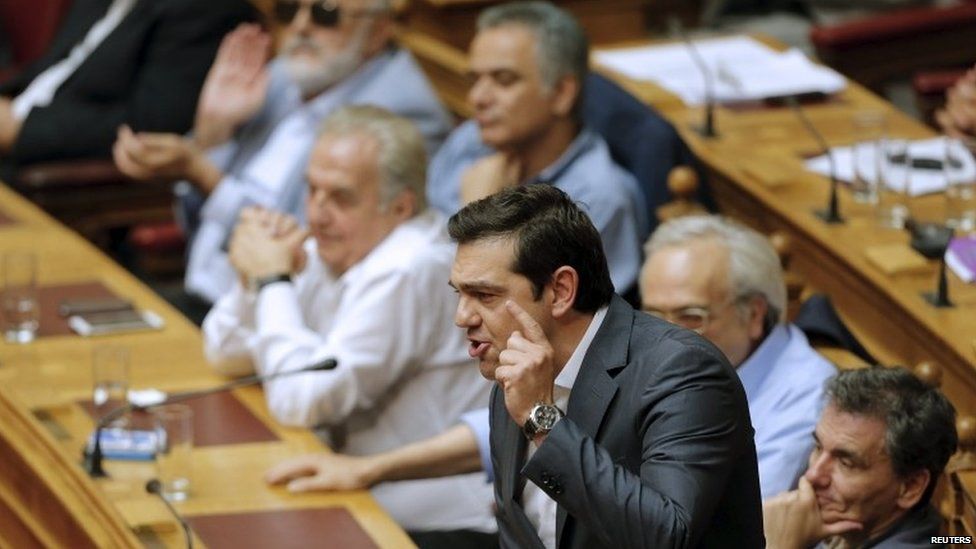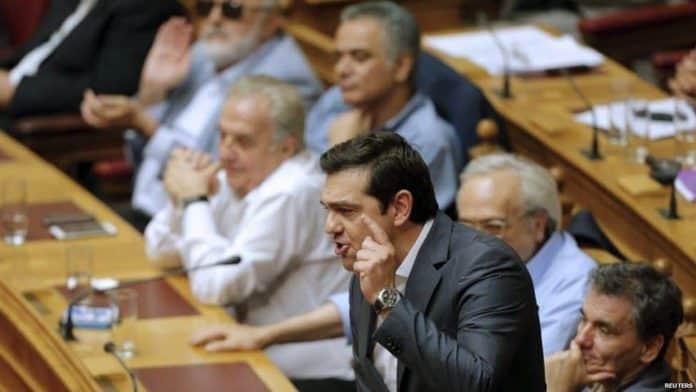-
16 July 2015
- From the section Europe

Greek PM Alexis Tsipras is focused on completing a bailout deal agreed with the eurozone despite setbacks in a crucial vote to push through tough reforms, his spokesman has said.
Gabriel Sakellaridis was speaking after Mr Tsipras won the late-night vote convincingly, but with more than 30 of his own MPs voting against him.
The vote means the government lost its majority but is expected to survive.
Eurozone finance ministers are due to discuss the vote in a conference call.
They will also consider short-term emergency funding to keep Greece afloat until the new bailout is finalised. Greece is facing an immediate cash crisis, with banks there closed for more than two weeks.
The European Commission has proposed giving Greece a €7bn (£5bn) “bridging” loan from an EU-wide fund to help the country pay debt interest due in several days.
The bailout deal provides for Greece to receive up to €86bn. Under the terms agreed in Brussels on Monday, the first tranche of legislation relating to tax and pensions had to be passed by Wednesday.
The Greek parliament discussed the bailout deal beyond a midnight deadline into Thursday morning.
Mr Tsipras won the vote by 229 votes to 64, with the support of some opposition MPs.
Analysis: Mark Lowen, BBC News, Athens
The measures passed comfortably – but not without a major rebellion within the government.
Alexis Tsipras said he’d had to choose between a deal he didn’t believe in or chaotic default. He has been weakened and will now need a reshuffle or a vote of confidence.
Of immediate concern for eurozone finance ministers on Thursday is how to fill Greece’s short-term cash needs, with the country facing a big payment to the International Monetary Fund (IMF) next week.
It could be financed from an EU-wide fund, which Britain opposes. And so there’s still a long road ahead. But one big obstacle here has been cleared.
Passionate opposition came from his own Syriza party, with parliamentary Speaker Zoe Constantopoulo calling the measures “social genocide”.
Former Finance Minister Yanis Varoufakis was another vocal opponent of the measures.
Energy Minister Panagiotis Lafazanis and Deputy Labour Minister Dimitris Stratoulis also voted against the package, prompting speculation they could lose their jobs in a reshuffle.
In his address to parliament Mr Tsipras said: “I acknowledge the fiscal measures are harsh, that they won’t benefit the Greek economy, but I’m forced to accept them.”
He added: “The Greek people can understand the difference between those who fight in an unfair battle and those who just hand in their weapons.”
He also said it was a “positive development” that one of Greece’s creditors, the IMF, had suggested that the bailout does not go far enough – and that some debts will need to be written off.
Banks still shut
Mr Sakellaridis said the vote was the first important step towards a deal and hinted that the government would try to remain in office despite losing its majority.
“The basic priority of the prime minister and the government is the immediate and successful completion of the agreement,” he said.
After eurozone finance ministers discuss next steps on Thursday morning, the European Central Bank’s governing council will meet to address how to keep Greece’s banks from collapsing.
Greek banks have been closed since 29 June, with cash withdrawals limited to €60 a day.
For Greece to secure its new funds, it must win the approval of the domestic parliaments of several of the other 18 members of the eurozone. Germany is expected to vote on the deal on Friday.
Greece must also commit to a major overhaul of the civil justice system by 22 July and agree to more privatisation, to review collective bargaining and industrial action and to make market reforms, including Sunday trading.
Thursday morning’s vote approved:
- VAT changes including a top rate of 23% to take in processed food and restaurants; a 13% rate to cover fresh food, energy bills, water and hotel stays; and a 6% rate for medicines and books
- An increase in corporation tax from 26% to 29% for small companies
- An increase in luxury taxes on big cars, boats and swimming pools
- An end to early retirement by 2022, increasing the retirement age to 67
Opponents of the bailout measures took to the streets of Athens in mainly peaceful protests ahead of the vote. However, one group threw petrol bombs at police officers who responded with tear gas.
Unions and trade associations representing civil servants, municipal workers and pharmacy owners also went on strike on Wednesday.




